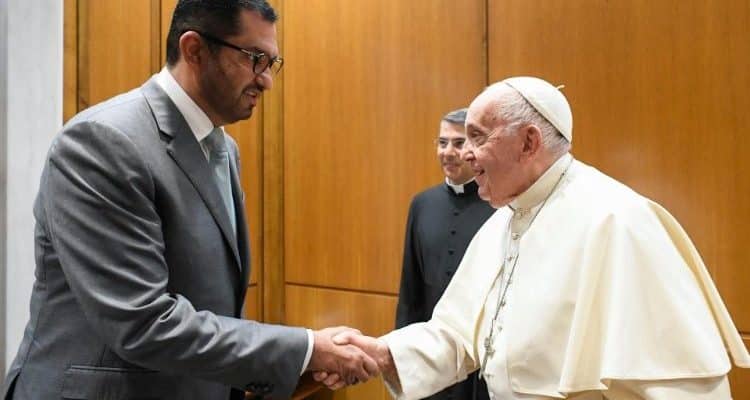Pope Francis' teams have sprung a surprise by announcing that he will be in Dubai from 1 to 3 December for a series of talks and speeches focusing on the ecological transition. The occasion will be the United Nations climate negotiations, which will be marked by the historic presence of an elected official from Rome.
This is a first since the launch of the United Nations Conference of the Parties on Climate Change (COP) in 1995. Pope Francis, head of the Roman Catholic Church, will be taking part in COP28, which opens on 30 November 2023 in the United Arab Emirates (UAE). Over three days, the Vatican’s environmental diplomacy will include private bilateral meetings, the inauguration of the “Pavilion of Faith” on the green Expo City site in Dubai, and a “keynote speech” to representatives of 194 countries and civil society organisations (CSOs) from every continent.
According to the papal press, this is a key event for the Bishop of Rome because it will be a question of “bringing about an international agreement to reduce greenhouse gas emissions”. This is the key to all the tensions between the nations of the North and South, particularly over who pays the bill for pollution and how to achieve a successful energy transition. Aware of the divisions and injustice often orchestrated by these issues for many decades now, Pope Francis wants to use his presence in the Emirati economic capital to advocate fairness and encourage consensus.
For the time being, there is no indication that any white smoke will come out of the negotiations between Europe, America, Oceania, Asia and Africa at the end of this apostolic visit. But it is clearly welcome within the host kingdom, since earlier in October 2023, the Pontiff received Sultan Al-Jaber (the President of COP28) at the “Holy See”, with whom they discussed the idea of adopting a “detailed action plan” to implement the Paris Agreement signed in 2015 at COP21.
Africa at the heart of the Vatican’s environmental diplomacy
As a reminder, this text, neglected by most of its signatories, aims to limit the rise in temperature to 1.5°C. This is the essence of the controversy surrounding the financing of climate resilience in developing countries by the major polluting countries. And in this labyrinth, African nations are the forgotten ones. We can therefore expect a papal message recommending that the world’s leaders take urgent measures to protect biodiversity, accelerate the development of clean energies and involve young people in the ecological transition.
Read also-AFRICA: Cairo, Lagos and Nairobi still in the Top10 most polluted cities
In Dubai, the African nations will undoubtedly be the most attentive to Pope Francis, who made a regional tour in February 2023. In Kinshasa, for example, the Argentine prelate was taken to task by environmentalists who expected him to denounce the major gas and oil projects under way in the Congo Basin. But he made up for his silence a little later in the second half of this year by publishing the encyclical Laudate Deum (Praise God), in which he condemns pollution by multinationals and warns against “the collapse of the earth”.
Benoit-Ivan Wansi






